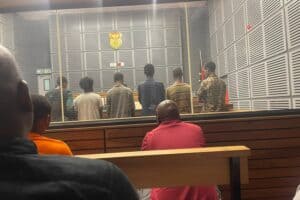Although these are the first publicly announced talks, a Western source has said secret contacts previously took place in Seychelles and Djibouti.

Warring sides in Ethiopia’s devastating two-year conflict are sitting down at the negotiating table Africa this week for their first formal peace talks.
The dialogue is led by the African Union, which had failed earlier this month to bring together teams from the Ethiopian government and the rebel Tigrayan authorities, in the face of fierce combat on the ground.
International pressure has intensified for the rivals to silence their guns in a conflict that has unleashed a desperate humanitarian crisis and, according to the US, claimed as many as half a million lives.
Ethiopia peace talks: Key players
The process is being facilitated by AU Horn of Africa envoy and former Nigerian president Olusegun Obasanjo, along with Kenya’s former leader Uhuru Kenyatta and South Africa’s ex-vice president Phumzile Mlambo-Ngcuka.
US regional envoy Mike Hammer is observing, along with Workneh Gebeyehu, executive secretary of the East African grouping IGAD and former Ethiopian foreign minister, and a UN representative.
Although these are the first publicly announced talks, a Western source has said secret contacts previously took place in Seychelles and Djibouti.
In June, Prime Minister Abiy Ahmed announced the creation of a committee to prepare for possible peace negotiations, while denying secret talks with the Tigray People’s Liberation Front (TPLF), the party that leads the rebel authorities in the northern region.
ALSO READ: Timeline: the conflict in Ethiopia’s Tigray
The government delegation is led by Deputy Prime Minister and Foreign Minister Demeke Mekonnen.
The seven-member Tigrayan team includes rebel spokesman Getachew Reda and top military commander Tsadkan Gebretensae.
Notably absent is Eritrea, which joined forces with Ethiopia’s army against its sworn enemy the TPLF, the party in power in Addis Ababa during a bloody border war in 1998-2000.
– What’s up for discussion? –
AU Commission chief Moussa Faki Mahamat described the talks as an “Ethiopian-owned and AU-led process to silence the guns towards a united, stable, peaceful and resilient Ethiopia”.
But before any comprehensive peace deal, the international community and the rebels are seeking an immediate cessation of hostilities.
“The situation in Ethiopia is spiralling out of control. Violence and destruction have reached alarming levels,” UN chief Antonio Guterres told reporters this month.
Fighting resumed on August 24, torpedoeing a five-month truce that had allowed limited aid into war-stricken Tigray, with both sides accusing the other of firing first.
Since then, pro-government forces have gained ground in offensives Addis Ababa says are aimed at protecting Ethiopia’s “sovereignty and territorial integrity” and taking control of airports and other federal sites in Tigray.
Ethiopian and Eritrean forces, using artillery bombardments and drone strikes, have captured a string of towns in Tigray including the strategic city of Shire, manouevring towards the capital Mekele.
“The first objective for mediators is therefore to try and get the federal and Tigray delegations to agree to a truce despite the momentum towards continued military confrontation,” said William Davison, senior Ethiopia analyst at the International Crisis Group think tank.
Humanitarian access and restoration of basic services to Tigray and its six million people is another key demand.
The region, where many are going hungry, is largely cut off from the outside world, with a communications blackout and shortages of food, fuel and medicines.
ALSO READ: Ethiopia says govt forces seize three towns in Tigray
Addis Ababa said this week it was working with humanitarian agencies to provide aid in the areas it had taken over.
The TPLF and the international community also want the withdrawal of troops from Eritrea, a feared and unpredictable player in the conflict.
Its soldiers, whose presence in the first phase of the war had long been denied by Addis Ababa, have been accused of atrocities against civilians.
– What are the prospects? –
The Pretoria negotiations are set to run until Sunday — but what’s next is unknown and analysts say an immediate breakthrough is unlikely.
“Battlefield developments have a direct bearing on power dynamics at the negotiating table and threaten to overtake political discussions given the current momentum of pro-government forces operating in Tigray region,” the Eurasia Group said in a note.
It said Addis Ababa appeared to be ratcheting up its demands, noting Demeke had called for the “dissolution of Tigrayan forces” before any settlement.
“Addis will now aim to leverage its military ascendancy to force a TPLF climbdown from red lines on disputed territories and restoration of basic services which have thus far thwarted talks.”
Tigrayan leader Debretsion Gebremichael remained defiant, saying victory was “inevitable”.
“We’re going to South Africa while still fighting,” he said this week. “Those joint enemy forces that entered Tigray will be buried.”
This video is no longer available.






